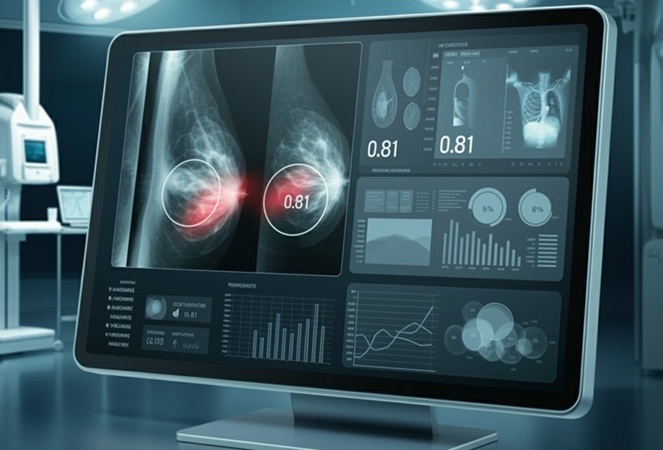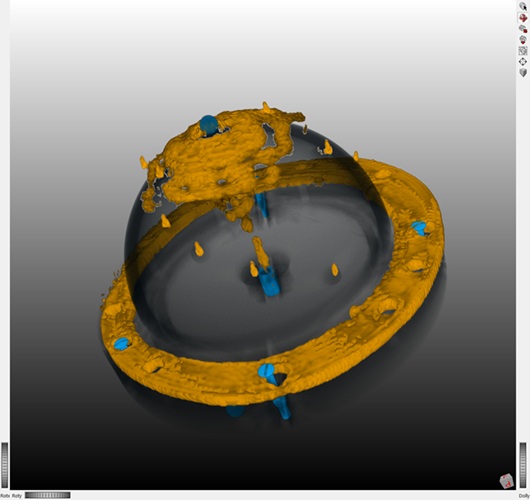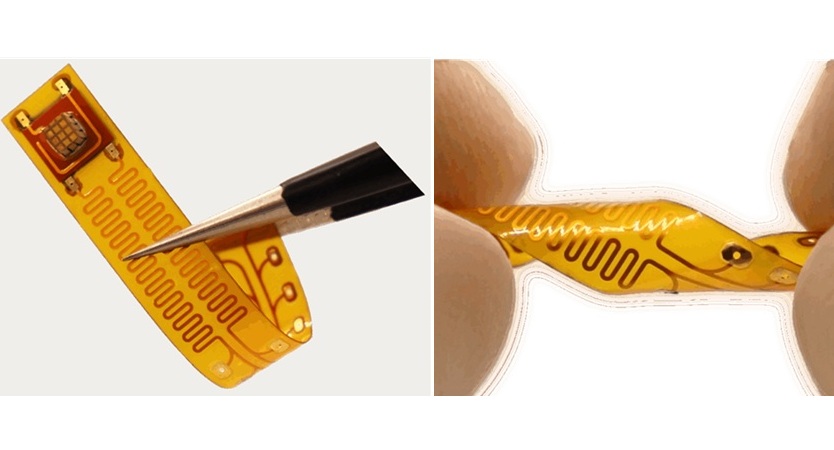Global AI in Medical Diagnostics Market to Approach USD 4 Billion by 2025
|
By MedImaging International staff writers Posted on 07 Sep 2021 |

Illustration
The global AI in medical diagnostics market is projected to grow at a CAGR of 50.2% from USD 505 million in 2020 to USD 3.87 billion by 2025, driven primarily by government initiatives to increase adoption of AI-based technologies, increasing demand for AI tools in the medical field, growing focus on reducing the workload of radiologists, influx of large and complex datasets, growth in funding for AI-based start-ups, and growing number of cross-industry partnerships and collaborations.
These are the latest findings of MarketsandMarkets Research (Pune, Maharashtra, India), a market research and management consulting firm.
Pandemics such as COVID-19 require investments for additional manpower, equipment, consumables, and other resources to ensure 100% preparedness for safety in hospitals and, if needed, eventual treatment of patients. The COVID-19 pandemic is an accelerator for AI technology by creating opportunities for leveraging these tools for healthcare advancement. AI and radiomics, which are being applied to X-ray and CT scans as advanced imaging tools in the detection and follow-up of COVID-19, have been able to diagnose the presence of the infection. This is because AI algorithms and radiomics used for chest X-rays can help undertake massive screening programs.
The growing awareness of the benefits offered by AI techniques and their wide application areas has led to the increased adoption of these products and services in the healthcare market. Various leading companies in the healthcare market are entering into partnerships and collaborations with leading AI technology providers to come up with innovative AI-based solutions for applications in healthcare. Such strategies enable these market players to offer advanced solutions to their customers and strengthen their position in this dynamic market space. Due to the growing demand for novel AI-based techniques in the medical diagnostics market, such developments are helping companies gain momentum in terms of developing advanced products and tools.
Extensive growth in digital health has enabled healthcare providers to assist patients through novel treatment approaches. AI technologies offer doctors with tools that help them better diagnose and effectively treat patients. However, there is an observed reluctance among doctors about new technologies. For instance, there is a misconception among medical practitioners that AI will replace doctors in the coming years. Doctors and radiologists believe that skills such as empathy and persuasion are human skills, and thus, technologies cannot completely rule out the presence of a doctor. Additionally, there is a concern that patients may show an excessive inclination toward these technologies and may forgo necessary in-person treatments, which might also challenge long-term doctor-patient relationships.
Currently, many healthcare professionals have doubts about the capabilities of AI solutions in terms of accurately diagnosing patient conditions. Considering this, it is challenging to convince providers that AI-based solutions are cost-effective, efficient, and safe solutions that offer convenience to doctors as well as better care for patients. However, healthcare providers are increasingly accepting the potential benefits of AI-based solutions and the spectrum of applications they serve. Hence, there is a possibility that in the coming years, doctors and radiologists will show more inclination toward AI-based technologies in healthcare.
In 2019, North America accounted for the largest share of 37.6% of the global AI in medical diagnostics market. However, the APAC market is projected to register the highest CAGR of 53.2% during the forecast period, primarily due to the growth strategies adopted by companies in emerging markets, improved medical diagnostic infrastructure, increasing geriatric population, rising prevalence of cancer, favorable government initiatives for AI in healthcare, and the increasing number of COVID-19 positive patients. Emerging markets such as India, China, and Brazil are expected to offer significant growth opportunities for players operating in the AI in medical diagnostics market. This can majorly be attributed to the rising patient population in these countries. Furthermore, the healthcare sectors in emerging economies, such as India and China, are rapidly growing, resulting in the introduction of new medical technologies with a special focus on advanced imaging equipment. All these factors, coupled with the growing population in these countries, are expected to increase the medical imaging data volumes in their respective healthcare systems. This provides a great untapped development opportunity for AI-based solutions in emerging countries.
Related Links:
MarketsandMarkets Research
These are the latest findings of MarketsandMarkets Research (Pune, Maharashtra, India), a market research and management consulting firm.
Pandemics such as COVID-19 require investments for additional manpower, equipment, consumables, and other resources to ensure 100% preparedness for safety in hospitals and, if needed, eventual treatment of patients. The COVID-19 pandemic is an accelerator for AI technology by creating opportunities for leveraging these tools for healthcare advancement. AI and radiomics, which are being applied to X-ray and CT scans as advanced imaging tools in the detection and follow-up of COVID-19, have been able to diagnose the presence of the infection. This is because AI algorithms and radiomics used for chest X-rays can help undertake massive screening programs.
The growing awareness of the benefits offered by AI techniques and their wide application areas has led to the increased adoption of these products and services in the healthcare market. Various leading companies in the healthcare market are entering into partnerships and collaborations with leading AI technology providers to come up with innovative AI-based solutions for applications in healthcare. Such strategies enable these market players to offer advanced solutions to their customers and strengthen their position in this dynamic market space. Due to the growing demand for novel AI-based techniques in the medical diagnostics market, such developments are helping companies gain momentum in terms of developing advanced products and tools.
Extensive growth in digital health has enabled healthcare providers to assist patients through novel treatment approaches. AI technologies offer doctors with tools that help them better diagnose and effectively treat patients. However, there is an observed reluctance among doctors about new technologies. For instance, there is a misconception among medical practitioners that AI will replace doctors in the coming years. Doctors and radiologists believe that skills such as empathy and persuasion are human skills, and thus, technologies cannot completely rule out the presence of a doctor. Additionally, there is a concern that patients may show an excessive inclination toward these technologies and may forgo necessary in-person treatments, which might also challenge long-term doctor-patient relationships.
Currently, many healthcare professionals have doubts about the capabilities of AI solutions in terms of accurately diagnosing patient conditions. Considering this, it is challenging to convince providers that AI-based solutions are cost-effective, efficient, and safe solutions that offer convenience to doctors as well as better care for patients. However, healthcare providers are increasingly accepting the potential benefits of AI-based solutions and the spectrum of applications they serve. Hence, there is a possibility that in the coming years, doctors and radiologists will show more inclination toward AI-based technologies in healthcare.
In 2019, North America accounted for the largest share of 37.6% of the global AI in medical diagnostics market. However, the APAC market is projected to register the highest CAGR of 53.2% during the forecast period, primarily due to the growth strategies adopted by companies in emerging markets, improved medical diagnostic infrastructure, increasing geriatric population, rising prevalence of cancer, favorable government initiatives for AI in healthcare, and the increasing number of COVID-19 positive patients. Emerging markets such as India, China, and Brazil are expected to offer significant growth opportunities for players operating in the AI in medical diagnostics market. This can majorly be attributed to the rising patient population in these countries. Furthermore, the healthcare sectors in emerging economies, such as India and China, are rapidly growing, resulting in the introduction of new medical technologies with a special focus on advanced imaging equipment. All these factors, coupled with the growing population in these countries, are expected to increase the medical imaging data volumes in their respective healthcare systems. This provides a great untapped development opportunity for AI-based solutions in emerging countries.
Related Links:
MarketsandMarkets Research
Latest Industry News News
- GE HealthCare and NVIDIA Collaboration to Reimagine Diagnostic Imaging
- Patient-Specific 3D-Printed Phantoms Transform CT Imaging
- Siemens and Sectra Collaborate on Enhancing Radiology Workflows
- Bracco Diagnostics and ColoWatch Partner to Expand Availability CRC Screening Tests Using Virtual Colonoscopy
- Mindray Partners with TeleRay to Streamline Ultrasound Delivery
- Philips and Medtronic Partner on Stroke Care
- Siemens and Medtronic Enter into Global Partnership for Advancing Spine Care Imaging Technologies
- RSNA 2024 Technical Exhibits to Showcase Latest Advances in Radiology
- Bracco Collaborates with Arrayus on Microbubble-Assisted Focused Ultrasound Therapy for Pancreatic Cancer
- Innovative Collaboration to Enhance Ischemic Stroke Detection and Elevate Standards in Diagnostic Imaging
- RSNA 2024 Registration Opens
- Microsoft collaborates with Leading Academic Medical Systems to Advance AI in Medical Imaging
- GE HealthCare Acquires Intelligent Ultrasound Group’s Clinical Artificial Intelligence Business
- Bayer and Rad AI Collaborate on Expanding Use of Cutting Edge AI Radiology Operational Solutions
- Polish Med-Tech Company BrainScan to Expand Extensively into Foreign Markets
- Hologic Acquires UK-Based Breast Surgical Guidance Company Endomagnetics Ltd.
Channels
Radiography
view channel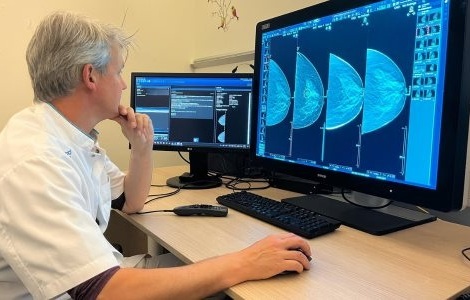
AI Hybrid Strategy Improves Mammogram Interpretation
Breast cancer screening programs rely heavily on radiologists interpreting mammograms, a process that is time-intensive and subject to errors. While artificial intelligence (AI) models have shown strong... Read more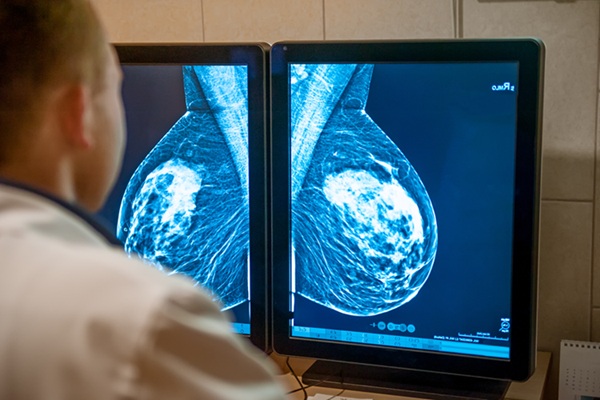
AI Technology Predicts Personalized Five-Year Risk of Developing Breast Cancer
Breast cancer remains one of the most common cancers among women, with about one in eight receiving a diagnosis in their lifetime. Despite widespread use of mammography, about 34% of patients in the U.... Read moreMRI
view channel
AI-Assisted Model Enhances MRI Heart Scans
A cardiac MRI can reveal critical information about the heart’s function and any abnormalities, but traditional scans take 30 to 90 minutes and often suffer from poor image quality due to patient movement.... Read more
AI Model Outperforms Doctors at Identifying Patients Most At-Risk of Cardiac Arrest
Hypertrophic cardiomyopathy is one of the most common inherited heart conditions and a leading cause of sudden cardiac death in young individuals and athletes. While many patients live normal lives, some... Read moreUltrasound
view channel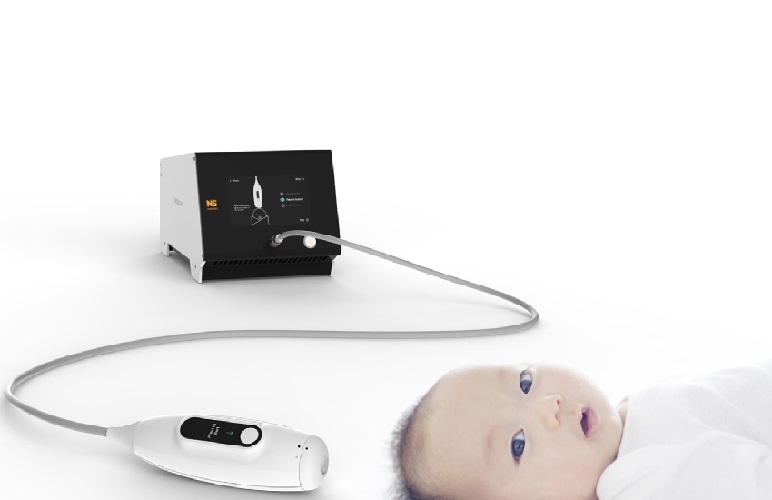
Non-Invasive Ultrasound-Based Tool Accurately Detects Infant Meningitis
Meningitis, an inflammation of the membranes surrounding the brain and spinal cord, can be fatal in infants if not diagnosed and treated early. Even when treated, it may leave lasting damage, such as cognitive... Read more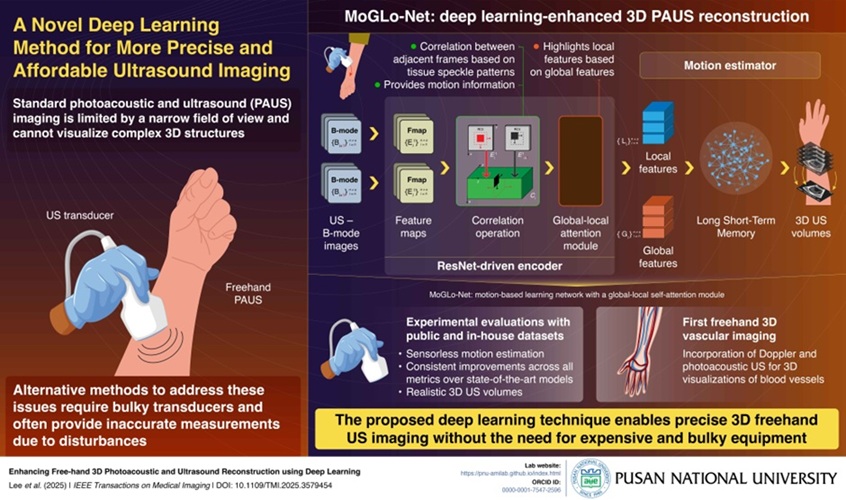
Breakthrough Deep Learning Model Enhances Handheld 3D Medical Imaging
Ultrasound imaging is a vital diagnostic technique used to visualize internal organs and tissues in real time and to guide procedures such as biopsies and injections. When paired with photoacoustic imaging... Read moreNuclear Medicine
view channel
New Camera Sees Inside Human Body for Enhanced Scanning and Diagnosis
Nuclear medicine scans like single-photon emission computed tomography (SPECT) allow doctors to observe heart function, track blood flow, and detect hidden diseases. However, current detectors are either... Read more
Novel Bacteria-Specific PET Imaging Approach Detects Hard-To-Diagnose Lung Infections
Mycobacteroides abscessus is a rapidly growing mycobacteria that primarily affects immunocompromised patients and those with underlying lung diseases, such as cystic fibrosis or chronic obstructive pulmonary... Read moreGeneral/Advanced Imaging
view channel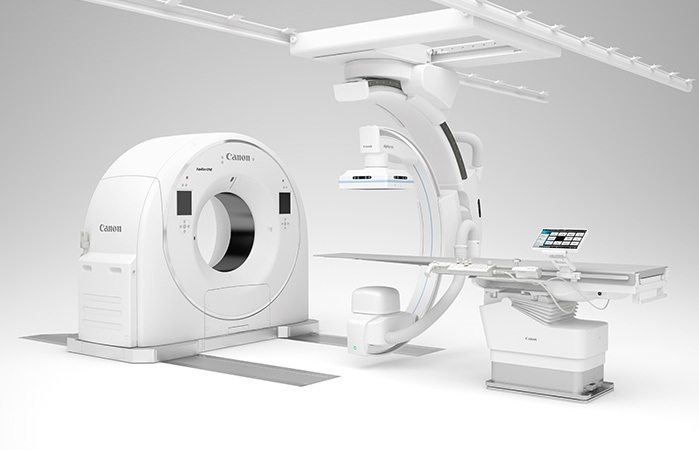
Cutting-Edge Angio-CT Solution Offers New Therapeutic Possibilities
Maintaining accuracy and safety in interventional radiology is a constant challenge, especially as complex procedures require both high precision and efficiency. Traditional setups often involve multiple... Read more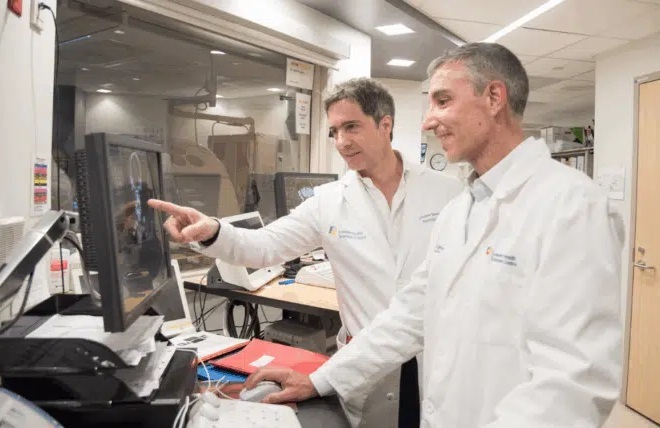
Extending CT Imaging Detects Hidden Blood Clots in Stroke Patients
Strokes caused by blood clots or other mechanisms that obstruct blood flow in the brain account for about 85% of all strokes. Determining where a clot originates is crucial, since it guides safe and effective... Read more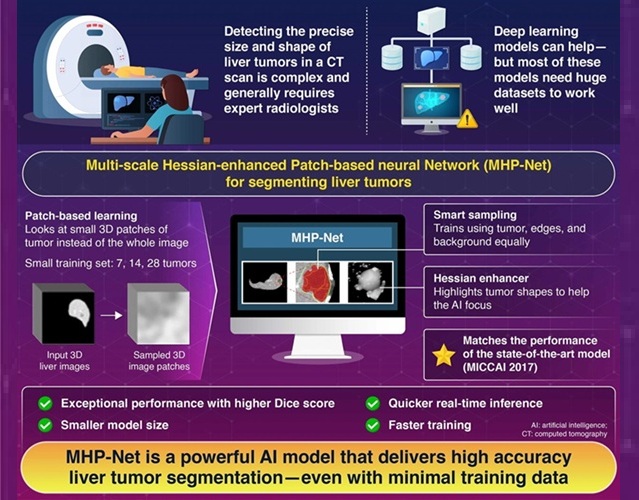
Groundbreaking AI Model Accurately Segments Liver Tumors from CT Scans
Liver cancer is the sixth most common cancer worldwide and a leading cause of cancer-related deaths. Accurate segmentation of liver tumors is critical for diagnosis and therapy, but manual methods by radiologists... Read more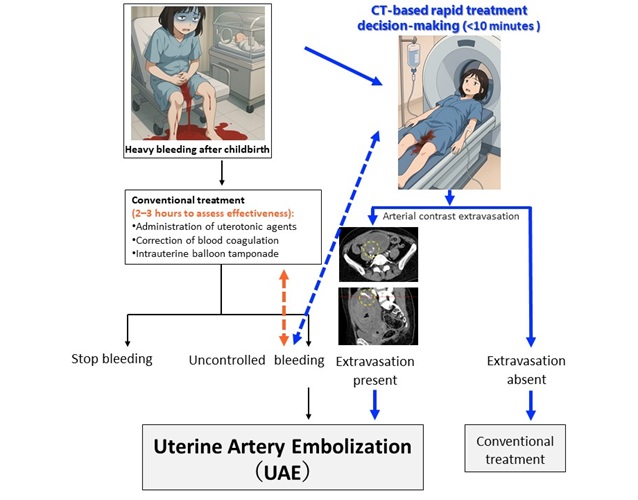
New CT-Based Indicator Helps Predict Life-Threatening Postpartum Bleeding Cases
Postpartum hemorrhage (PPH) is a leading cause of maternal death worldwide. While most cases can be controlled with medications and basic interventions, some become life-threatening and require invasive treatments.... Read moreImaging IT
view channel
New Google Cloud Medical Imaging Suite Makes Imaging Healthcare Data More Accessible
Medical imaging is a critical tool used to diagnose patients, and there are billions of medical images scanned globally each year. Imaging data accounts for about 90% of all healthcare data1 and, until... Read more












